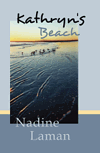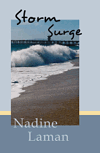Recently I was watching a crime show on television. The story was pretty good, but as I looked at the clock and they only had 15 minutes left (including commercials), I began to wonder if the crime was going to be solved.
It was a complicated crime and the characters were interesting. There were several unrelated suspects and the stars kept following leads well into the show.
Then it came. The forensics expert came up with information that came out of no where to solve the case. There had been no hints. It was as if this information was from another script entirely. In writing that is called dropping alligators (answers) over the transom.
I can't say that I'm thrilled with the endings of Kathryn's Beach or High Tide. Storm Surge ends much better. Good thing that it does because it also carries the weight of ending the trilogy.
The end of the story is just as important as the beginning. There is tons of material about writing killer first lines. Not only does the first line have to hook the lit agent or publisher, it has to hook the reader.
Then it goes from there, the next few chapters have to set that hook firmly. The middle has to keep 'em reading, and the end has to deliver satisfaction.
I think the tricky part is to do the end. Write the first draft through, beginning to end, without going back to edit. Honestly, that see-saw back and forth of trying to edit as you write really shows, you aren't fooling anyone. It is like putting on the second coat of paint on one part of the wall when you don't have the first coat done on the whole room. It shows when the paint drys - oh yes, it does.
At the first time through with rewrites and edits, look at the end bit. Was all the solution heaped in a pile? If so, take each section and divide it up. The telling part should be sensibly placed throughout the ms. Best to scatter it through in dialogue or bits of scenes. Then when the solution/resolution of the subplots come, it isn't a huge surprise like a bucket of cold water in the face.
Most of the time we want the reader to be surprised in the right way, the way that they are delighted and satisfied that everything came together logically. We don't want them surprised like I was in that show I mentioned in the beginning of this post. All the subplots don't have to wait until the last chapter to be resolved. Some can be completed sooner and used for the main plot to stand upon for its resolution.
It is hard to see the trees for the forest in our own writing. Get someone you trust to be honest and helpful to dispassionately discuss the story with and be honest with yourself if you need to hire a content editor. Don't be territorial over each precious word. The point of writing is to give the reader a good story.
Wednesday, November 11, 2009
Subscribe to:
Post Comments (Atom)

 When Paul Fenton stops for breakfast in a small town, he gets more than he bargained for in the process.
When Paul Fenton stops for breakfast in a small town, he gets more than he bargained for in the process.
 When two-hundred-year-old human remains are discovered on one of Neptune's moons, Earth's history falls into question.
When two-hundred-year-old human remains are discovered on one of Neptune's moons, Earth's history falls into question.
 Emily's husband persuades her to try thalidomide to ease her symptoms as she is unaware of the devastating effects.
Emily's husband persuades her to try thalidomide to ease her symptoms as she is unaware of the devastating effects.
 Who is the women's shelter bomber? Melissa Ryan suspects that her husband knows.
Who is the women's shelter bomber? Melissa Ryan suspects that her husband knows.
 Further developments with the Wilder family.
Further developments with the Wilder family.
 A hidden past shakes the O'Donovan family to its core
A hidden past shakes the O'Donovan family to its core
 A swirl of emotion and choice, set in Cape Town, South Africa
A swirl of emotion and choice, set in Cape Town, South Africa
 Love is a constant, but it comes at a price.
Love is a constant, but it comes at a price.
 When the road ahead is unclear, sometimes you have to rely on trust.
When the road ahead is unclear, sometimes you have to rely on trust.
 The struggle between good and evil is ages old. It gets all the more complicated when the good guys aren't all good and the bad guys have redeeming qualities.
The struggle between good and evil is ages old. It gets all the more complicated when the good guys aren't all good and the bad guys have redeeming qualities.
 Story of a land mothering two races of people – the light-skinned and the dark-skinned.
Story of a land mothering two races of people – the light-skinned and the dark-skinned.
 A gifted Ukrainian ballerina comes into possession of a mysteriously coded address book.
A gifted Ukrainian ballerina comes into possession of a mysteriously coded address book.
 Six passengers' lives change for better or worse after they arrive in Honiton.
Six passengers' lives change for better or worse after they arrive in Honiton.
 Resilience and love in a harsh and unforgiving age
Resilience and love in a harsh and unforgiving age
 Kathryn's Beach
Kathryn's Beach High Tide
High Tide Storm Surge
Storm Surge
No comments:
Post a Comment